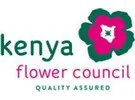Despite troubling times, the Kenyan floral industry is hanging in there, but things are much more difficult than ever before. The two main issues weighing growers and exporters down are high freight costs and the tax regulations issued by the new government. And there are more challenges the Kenyan floral industry is dealing with, but according to Clement Tulezi from the Kenya Flower Council (KFC), the industry is not about to give up. “We are proud of our achievements so far. We are These challenges, though hard to swallow, create more resilience for the sub-sector. ”

Clement Tulezi at the IFTF 2023 in Vijfhuizen, the Netherlands.
Challenges: Freight & regulations
How is it that oversea shipping and airfreight is still so expensive in Kenya compared to their neighboring countries right now? The prices are still high after Covid-19. Tulezi: “A lot of producers are telling me they are losing orders, as their buyers tell them it’s cheaper to buy from other producing countries. It’s all about cost of freight. The price of shipping needs to go down. Pre-Covid, a kilo of freight to Europe for instance was about 1.4 dollars per kilo; today, the price is in the realm of 2.4 dollars per kilo. Yet, our competitors are shipping with way less to the same market. How can Kenyan exporters compete?”
According to Tulezi, the government can do something about this and support the industry. “Reduce taxes on elements that have an impact on freight such as jet fuel. That will allow more foreign airlines into Nairobi. There are also certain costs the government can take away, such as the landing costs. This will create a real competition, which can drive down the prices. Also, the airlines have a role here – we are giving them good business in Nairobi,” he says.
The government has driven up the cost of doing business in terms of taxes and levies to proportions that have never been seen before. And for the fresh produce sector, these costs affect them on a daily basis. “KFC is constantly advocating against taxes and levies at national and county government levels that are causing businesses to be unsustainable. And with added regulations in the market, it costs a lot of money to run a business in Kenya today.”
Then there are plant health concerns, mainly surrounding the False Codling Moth (FCM), which European Union Report says comes from roses grown in Africa; and can contaminate European cultivation of citrus. “Roses are our main exports to the European Union. A good 70% of our roses end up in the European Union. Any measure to increase control will negatively affect Kenya’s supply of roses. As growers, we have worked hard to reduce FCM on roses evident by the reduced number of interceptions in 2022 and 2023. We pray that the EU will appreciate these efforts.”
Achievements: Sustainability & export
There is another trend KFC is seeing in the European market, a call around sustainable practice. Is worth mentioning here that Europe alone can’t produce enough for its flower market. The EU therefore has to import flowers from elsewhere. Yet, producing countries like Kenya still have reputation issue based on stories from 15 or 20 years ago. Anyone who has visited flower farms in Kenya recently will appreciate that these stories don’t hold anymore. “Looking at 20 years ago and now, a lot has changed in the sector. Less chemical, less fertilizer, better water usage, green energy and active steps being taken to reduce the carbon footprint, including switching to sea freight among others. The market needs to understand, we are not just turning a blind eye on these issues. We are working tirelessly, putting in place systems and mitigating risks, but it’s a journey that may not be accomplished in a few days. It might take a few more years to get to 100 per cent, if that is possible, but collectively we are working together the goal. There are many challenges, but there is also a lot of hope. We are proud of our achievements as a country and the changes we made so far.”
Good hopes for the future
“Despite these challenges, we’re not about to close shop. It just gives us the resilience. And it gives us the opportunity to focus on the major things that need attention - looking after our workers, the environment, and making sure we are more ethical, accountable and transparent. And at Kenya Flower Council we are ready to support the growers, exporters, producers, and the entire supply chain, where we can, to ensure we provide tangible and practical solutions to them,” Clement concludes.
For more information:
Kenya Flower Council
[email protected]
kenyaflowercouncil.org










